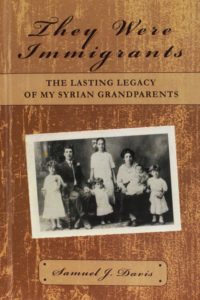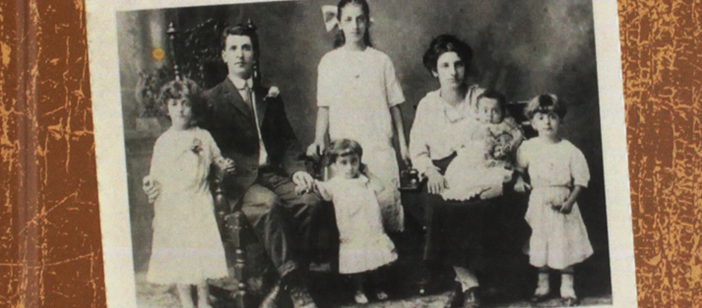Samuel J. Davis is an attorney who lives in Uniontown, Pennsylvania, where he has practiced law since 1976. Though he has told and retold stories all of his life, this is Davis’s first book.
About the Book: They Were Immigrants is a history of the life and times of Joe Solomon, a Syrian who immigrated to southwestern Pennsylvania at the beginning of the 20th century. Written by his grandson, Samuel J. Davis, They Were Immigrants doesn’t shy away from Solomon’s brushes with the law — or from his legacy: the long and successful lives of his twelve children and their tight-knit families.
 In the early days of the 20th century, my four grandparents fled their homeland. They left with their pride and the clothes on their back and by way of Ellis Island settled here, in what were then the coal fields of southwestern Pennsylvania. They were refugees.
In the early days of the 20th century, my four grandparents fled their homeland. They left with their pride and the clothes on their back and by way of Ellis Island settled here, in what were then the coal fields of southwestern Pennsylvania. They were refugees.
They left the Cradle of Civilization from the Valley of the Nazarene—from their ancestral homes, from their parents and friends—for the New World. They never returned. They were refugees.
They started families. They worked hard. Their children, grandchildren, and great-grandchildren became teachers, judges, dentists, businessmen and businesswomen, bankers, psychologists, lawyers, doctors, software developers, moms, dads, and grandparents. They served in the Army, Navy, and Air Force and fought overseas in World War II and Vietnam. They donated to the less fortunate. They became members of school boards and church councils. They employed thousands and paid millions in taxes. They were and are the descendants of refugees.
My maternal grandfather was born Yuseff Salom and became Joe Solomon. My paternal grandfather was born Saado al Dayoob and became Sam Davis. I am proud to be their grandson. They were refugees. They were Syrian refugees. It is not liberal or conservative to want and seek security, nor is it liberal or conservative to cherish the values on which this nation was founded. Certainly, at times, the xenophobes screamed, “Stop the Irish!” Had they succeeded, there would not have been a J.F.K. Many certainly warned, “Don’t let the Dutch in.” If they had prevailed, there would not have been a Ronald Reagan. Their ancestors sought shelter against the storms of famine, war, and oppression; they were refugees. We Americans hold up a beacon of light and stand strong against the tyrants and terrorists when we bend low to open the door to those poor souls desiring nothing more than hope. America is the refuge for the refugee.
The foregoing was my position on immigration — more precisely, my reaction to the general common condemnation of immigration and immigrants by some political leaders. Most of the people in the town where I was raised were closely related in time to the immigrant experience, with either parent or grandparent born somewhere else. I thought that when I was older, at some ancient age of 40 or 50, I would magically start speaking Syrian because everyone that had reached those milestones spoke with an accent.
My experience was far different than what the politicians thought they knew about immigration. Immigrants were not just statistics or people who cut grass, installed windows, or sold Slurpies at the 7-11; they were my boyhood friends’ parents. They were my neighbors; they were my town.
I grew up surrounded by my mother’s family, the Solomon family. I identified with them to such a degree that my mother proudly told me that as a boy I often said my name was “Sammy Solomon.” That must have hurt my father. I am very proud of my father, who, like my mother, comes from unadulterated Middle Eastern stock, but his family was smaller and lived a short distance away; my mother’s family was large and ever present. My cousins were our brothers and sisters; my aunts and uncles were closer to us than many parents are to their natural-born children. That is not an exaggeration, feeling the way I did. I once said to my brother that I, like the Bible story, would sell him my “birthright” as I thought it paled to that of my Solomon cousins. It hurt my father’s feelings and for that statement I am eternally sorry. I am very proud of my name and even the fact that the original Arabic, “Dayoub,” was somehow anglicized.
My mother’s family was overwhelming in their cohesion — so tightly knit that we felt safe in their presence because we were a part of it. My mother was so protective of her brothers, sisters, nephews, and nieces that she defended them blindly, explaining or justifying all of their actions, even the faux pas. Don’t ever be critical of her family in her presence! And that applied to me and my brother.
I posted the first few paragraphs of this prologue — about my grandparents and their immigration — on Facebook a number of years ago, and when I shared them, I believed all that I said. I have done some research since then and now realize that my grandfather committed many more crimes than I first was led to believe. Perhaps his documented criminal history caused, in part, my mother’s blanket protection. Who knows?
I do know this: I loved them, some much more than others, but I did love dearly my mother’s family. They were important characters in my life. The stories that follow are as true as the accuracy of my memory.
Copyright © Samuel J. Davis. This excerpt is published here courtesy of the author and should not be reprinted without permission.

























